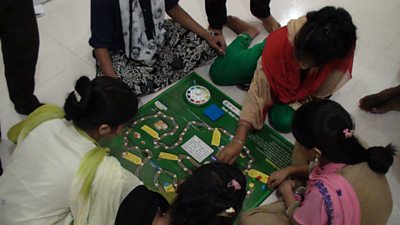Downloads
Qualitative research found that radio magazine show Dosh Unisher Mor (Crossroads at 10 to 19) provided adolescents with a much-needed source of information on topics deemed taboo, such as sexual and reproductive health (SRH) and gender based violence (GBV).
In addition to acquiring knowledge, listeners reported attitudinal changes and increased confidence to tackle related problems. However, adolescents and parents were still reluctant to discuss these issues.
Published: April 2017
Context
In Bangladesh, SRH and relationships are often not discussed in schools and homes as they are considered taboo topics. However, with over one-fifth of its population aged 10-19 and pregnancy among teenage girls extremely common – 27% are mothers and another 6% are pregnant with their first child2 – ensuring adolescents can access reliable SRH information and services is both a priority and a challenge for Bangladesh.
The project
Dosh Unisher Mor, a 15-minute-long weekly radio magazine show, produced by ±«Óătv Media Action as part of the Generation Breakthrough project (2014-2016), aimed to address this need. Comprising of a short drama segment, a song, and interviews with experts and adolescents, it specifically sought to increase Bangladeshi adolescents’ knowledge and self-efficacy in seeking information and talking to their trusted elders about SRH and GBV.
Research approach
To explore whether, how, and why Dosh Unisher Mor influenced listeners’ knowledge, attitudes and self-efficacy –belief in one’s capacity to do something – regarding SRH and GBV, ±«Óătv Media Action undertook a qualitative study. This study comprised of in-depth interviews with 24 listeners (12 male and 12 female adolescents) and 12 gatekeepers (parents and teachers).
Key findings
- Listeners reported that they had very few trusted sources of information and advice on SRH issues. In such a context, they perceived Dosh Unisher Mor to be an educational and entertaining programme that was unique in its exclusive focus on these topics. Unlike any other radio shows, listeners felt Dosh Unisher Mor addressed adolescent issues directly to them and reflected their lives and concerns.
- Adolescents were most engaged with and recalled content relating to physical changes experienced during adolescence (e.g. wet dreams, menstruation and growth of pubic hair). This was unsurprising given that discussing these issues (faced by all) was deemed a social taboo and that parents rarely initiated such conversations. Listeners praised the show for dispelling misperceptions and fulfilling an unmet need for practical and relevant guidance.
- Dosh Unisher Mor also shifted audiences’ perceptions of and attitudes towards GBV. Listeners said the show made them aware that, along with physical harassment, verbal and mental harassment also constituted GBV. Many said they used to perceive verbal harassment and eve teasing3 as normal but, having listened to the radio programme, they now understood that these were also sexual assaults. Adolescents said Dosh Unisher Mor had taught them that GBV could not be explained as resulting from the victim’s provocative clothing or behaviour. They also reported having learned what to do if they, or anyone they knew, were to be sexually assaulted.
- Listeners felt obliged to and capable of taking a proactive role in fighting against social wrongdoings. Some shared stories about actions they had taken – such as helping to stop early marriage – after listening to the programme, while others highlighted having learned that early pregnancy could put both babies and young mothers at risk of health complications and even death.
- Adolescents felt the open and natural discussion and detailed explanations Dosh Unisher Mor provided both contributed to generating learning and attitudinal change across the topics covered. They also appreciated that the show featured practical solutions to real-life dilemmas.
- Although listeners felt more confidence to seek advice on SRH and GBV-related issues after listening to the show, many still preferred to avoid embarrassing conversations and instead acquire answers from the radio. Parents also preferred to avoid these uncomfortable discussions and, in some cases, felt unequipped to answer their adolescent children’s questions.
Implications
Given that adolescents in Bangladesh report limited access to trusted information, there is a continued need for radio programmes such as Dosh Unisher Mor. Considering the current media consumption habits of teenagers, which were also described by the research participants, social media platforms (particularly Facebook) also offer opportunities for providing further information and advice on these topics.
That adolescents and their parents prefer to avoid uncomfortable discussions around SRH and GBV suggests there is a need to create an environment that fosters such conversations. Media programmes seeking to guide parents on how to have such discussions with their adolescent children could assist with this.
